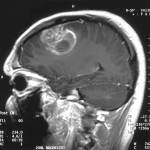
Digital News Report- Researchers at the UC Davis Cancer Center have found a molecule that specifically targets glioblastoma, an aggressive form of brain tumor that is known for being difficult to operate on due to its poorly defined borders and irregular shapes. This form of cancer accounts for 52% of all primary brain tumor cases and 20% of all intra-cranial tumors.
The current treatment for these kinds of tumors consists of surgery followed by radiation and chemotherapy. Kit Lam, senior author of the study and UC Davis chief of hematology and oncology has said that, “it is unfortunate that this approach does not extend survival significantly. Most patients survive less than one year.”
Lam and his colleagues were searching for a molecule that could be injected into a patient’s bloodstream and deliver high concentrations of medication or radionuclide treatment directly to brain tumor cells that would leave normal tissue unharmed. Through their research they discovered a molecule called LXY1 that binds to a cell-surface protein called alpha-3 integrin, which is over-expressed in the cancer cells. Using near-infrared fluorescence imaging on lab mice they found that the molecule preferentially bound with human glioblastoma cells.
“This outcome gives us great hope that we will be able to deliver targeted therapies to treat glioblastoma,” said Lam. They plan to continue their research with repeated experiments in the near future.
The UC Davis Cancer Center provides care for more than 9,000 adults and children each year and has 150 adult clinical trials and 50 pediatric clinical trials. Recent research has led to the development of a breast CT that can detect breast cancer earlier than mammography as well as the development of investigation of new agents for leukemia, prostate and neurological cancers.
The full report on the LXY1 molecule will be printed in the January 2009 issue of the European Journal of Nuclear Medicine and Molecular Imaging.
